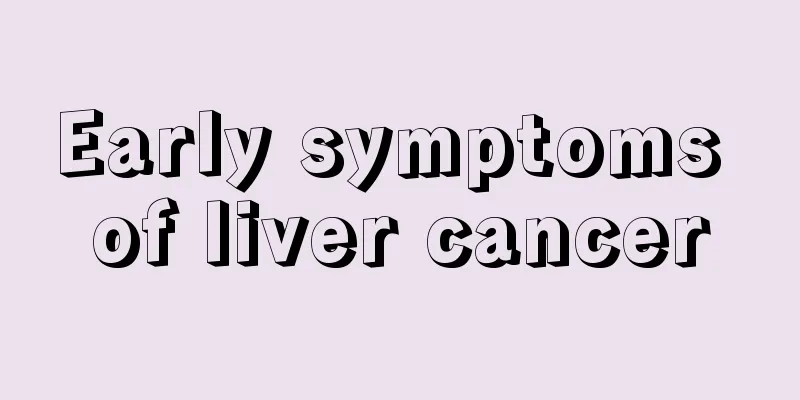Early symptoms of liver cancer

|
Early liver cancer may have no symptoms or signs. Once typical clinical manifestations appear, it is already in the middle or late stage of liver cancer. Common symptoms of liver cancer include: pain in the liver area, lack of appetite, weight loss, fatigue, unexplained fever, abdominal distension, diarrhea, jaundice, etc. 1. Pain in the liver area is often caused by the rapid growth of the tumor, which increases the tension of the liver capsule, or the tumor involves the liver capsule; it is often the first symptom of mid-to-late stage liver cancer. The pain is mostly located in the right ribs or under the xiphoid process. At first, it is mostly intermittent or continuous dull pain or stabbing pain. The pain may be mild or severe, or it may be relieved by itself within a period of time, or even disappear. The pain is more obvious at night, and sometimes analgesics are needed. If the tumor is located at the top of the diaphragm of the right lobe of the liver, the pain may often radiate to the right shoulder or right back; if the tumor is located in the left lobe of the liver, the upper and middle abdominal distension and pain will appear earlier. When the tumor is located deep in the substance of the right lobe of the liver, pain is generally rare. If the pain in the liver area suddenly intensifies, accompanied by tenderness or positive muscle belly sign, it should be considered that the liver has ruptured or the tumor has bled under the liver capsule. 2. Gastrointestinal symptoms often manifest as decreased appetite, upper abdominal fullness after meals, or even nausea, vomiting, or diarrhea. Gastrointestinal symptoms are often caused by pathological changes in the liver, resulting in increased pressure in the portal vein system, digestive tract dysfunction, or enlarged tumors compressing or involving the stomach. 3. Weight loss and fatigue often occur in the middle and late stages of liver cancer. This may be caused by tumor metabolites causing changes in the body's biochemical metabolism, coupled with reduced food intake. In severe cases, cachexia may occur. 4. Fever The fever caused by liver cancer is generally between 37.5 and 38°C, occasionally reaching above 39°C, with irregular fever patterns, often without chills. Fever is more common in the afternoon, and sometimes remittent high fever can be seen. Fever can be caused by tumor necrosis or its metabolites. 5. Other symptoms include hepatitis, cirrhosis, or large infiltrative tumor growth leading to liver decompensation. Patients may have a tendency to bleed, such as bleeding from the gums, nose, and subcutaneous ecchymosis. They may also have hypoproteinemia, edema, ascites, and abdominal distension. Tumor metastasis to the lungs may cause coughing. When the tumor invades and blocks the hepatic vein or inferior vena cava, progressive lower limb edema may occur, and even ascites and other manifestations of Budd-Cha syndrome may occur. |
>>: Prevention of liver cancer
Recommend
How to treat bad breath
With the faster and faster development of moderni...
Houseplants that absorb drugs and purify the air
Whether in the office or at home, the air is full...
Can melasma be effectively removed?
Chloasma troubles many people. Most people think ...
What is the cause of acne on the jaw
For girls who love beauty, getting acne is a pain...
What kind of lenses are good for your eyes?
The eyes are the most vulnerable sensory organ of...
Rational use of drugs for osteosarcoma
Osteosarcoma is a disease that is common among ad...
Will the Sichuan pepper shell soften on its own?
Sichuan peppercorns are a common thing in daily l...
What should I do if I feel upset
Today, in the 21st century, the economy is highly...
What are the symptoms of sub-healthy people
With the continuous improvement of social economy...
What is the reason why oral ulcers do not heal for a long time? These factors should be taken seriously
Many people suffer from recurrent oral ulcers whi...
What foods are good for pigmentation caused by burns
We usually use hot water almost every day, and we...
Is there any specific medicine to treat the sequelae of shingles?
I believe that in life, there is no disease more ...
Why do I sweat all the time
We all know that sweating is a form of detoxifica...
Does mutton cause internal heat? Who is not suitable to eat it?
Mutton is a very common food ingredient, suitable...
How can women prevent breast cancer? Women should pay attention to these 8 points to prevent breast cancer
Breast cancer is a common disease among female fr...









